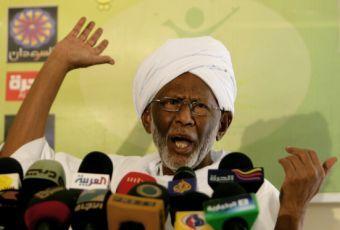Leading PCP figure offers rare criticism of Turabi
January 19, 2014 (KHARTOUM) – The leading figure at the opposition Popular Congress Party (PCP), al-Mahboub Abdel-Salam, has called for resignation of his party’s secretary general, Hassan Al-Turabi, holding him responsible for its ineffectiveness.

“According to contemporary political norms, he who committed a major mistake in politics should immediately offer an apology which did not happen when the PCP was found”, Abdel-Salam wrote.
He pointed in the memo which was seen by Sudan Tribune to the role of the Islamic Movement (IM) in the 1989 coup which brought the Sudanese president Omer Hassan Al-Bashir to power.
Turabi had several times in the past acknowledged his role in the coup and admitted that it was a mistake.
The Islamists split in 1999 following a bitter power struggle between Bashir and Turabi, with the latter subsequently ousted from his post as parliament speaker.
Turabi later established the Popular Congress Party (PCP) and has since been a vociferous critic of the very regime for which he orchestrated the army-backed seizure of power in 1989.
Abdel-Salam added that clutching of old leadership on their positions hindered to a large extent conducting comprehensive review within the IM, saying that existence of the same leadership reflected continuation of the “old discourse”.
He said the IM historic leadership sought to justify its participation in the regime during the first decade through some achievements such as the expansion of higher education institutions and downplayed those achievements saying that they were made by a dictatorship regime.
But the PCP deputy secretary general, Abdalla Hassan Ahmed, dismissed Abdel-Salam’s criticism of Turabi and stressed the PCP doesn’t feel guilty about the 1989 coup, saying that it mustn’t be held accountable for the regime’s policies and failures.
He added that political action should not be linked to age as long as the leader is able to “think and move”, saying that we can’t ask leaders of the National Umma Party, Al-Sadig Al-Mahdi, and the Democratic Unionist Party (DUP), Mohamed Osman Al-Mirghani, to resign simply because they have “grown older”.
Ahmed also refused to hold Turabi responsible for the long delay of the PCP general convention and said that it was delayed due to financial issues, linking reform within the PCP to regime change.
He further asserted the PCP is ready to face any potential changes in the country.
Abdel-Salam called the PCP to renew its principles and develop a new political vision for building the Islamic state, saying that experience of Islamic parties in Egypt, Tunisia, and Turkey offer good opportunity for reviewing PCP’s ideology.
He added that 1999 split led to the personification of the differences between Turabi and his disciples and killed intellectual debate within the party.
Last year, Abdel-Salam called for unification of Islamic forces in Sudan and correcting the path of the ruling National Congress Party (NCP), saying that the fall of the regime would be a final defeat for Islamic project in Sudan forever.
Several PCP members including Sudan’s former vice president, Al-Haj Adam Youssef, who was close to Turabi have joined the ruling NCP under the pretext that Islamic state project necessitates giving up personal differences and reuniting the party again.
(ST)
